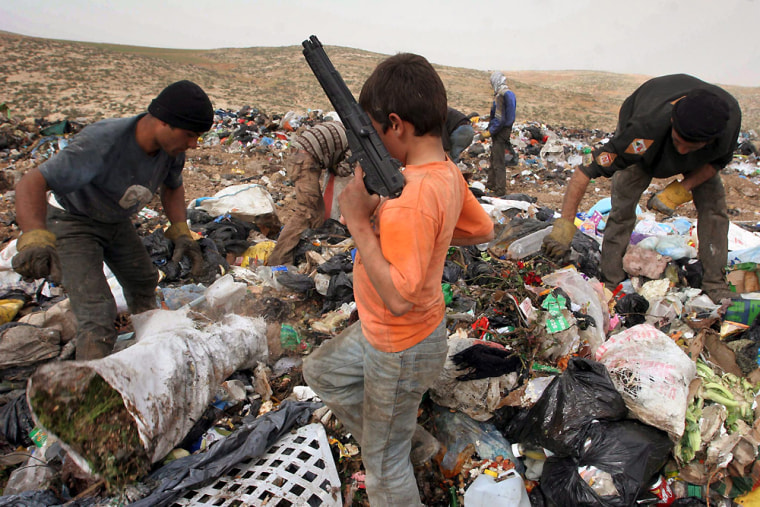Palestinian policeman Ibrahim Abu Hattab, a father of four, already owes half his next salary to the local grocery for food, diapers and cigarettes, but doesn’t know whether he’ll ever get a paycheck again.
Abu Hattab and some 140,000 other Palestinian government employees were dealt a blow Friday when the European Union announced it is cutting off aid to the new Hamas rulers and the United States said it will cancel or suspend more than $411 million in projects aimed at indirectly assisting Palestinians.
Hamas has said it is broke and will have trouble paying employees without massive foreign aid. Government salaries sustain about one-third of the Palestinians in the West Bank and Gaza. After more than five years of fighting with Israel, about 43 percent of the Palestinians live in poverty.
Hamas complained Friday that the aid cutoff amounts to collective punishment of the Palestinians. However, the Islamic militant group refuses to meet the international community’s conditions for restoring aid — recognition of Israel, renunciation of violence and acceptance of existing peace agreements.
Many Palestinians, especially those working for the government, are increasingly worried about the future, following Friday’s announcements from Brussels and Washington.
Paychecks overdue
In Gaza City, Abu Hattab, a military policeman, said he makes about $360 a month to support a family of six. March paychecks are a week overdue, and the Palestinian finance minister, Omar Abdel Razek, has said he’s $85 million short of covering the monthly payroll — more than half the required total.
Abu Hattab, 27, said that if even he eventually gets paid for March, he’ll have to give nearly half his paycheck to the neighborhood grocery for last month’s expenses and may not have enough for rent.
If Hamas cannot provide for the Palestinians, it has no business staying in power, he said.
“It’s not simple for Hamas, but we want to live, with or without Hamas,” Abu Hattab said. “If it gets worse, then we can just say farewell (to Hamas).”
With the Palestinian Authority strapped for cash, government paychecks have repeatedly been late during the past five years of Israeli-Palestinian fighting. The economic downturn has spurred domestic unrest, including members of the security forces seizing government offices to press for jobs or higher wages.
However, Palestinian President Mahmoud Abbas and members of his Fatah Party made the payroll each month, often by borrowing from banks or appealing to foreign donors for more cash. Hamas does not have such an option.
'No exit'
In the West Bank town of Ramallah, the Bakir family was especially worried because both parents work for the government.
Ayshe Bakir, 45, a manager in the Education Ministry, said she and her husband have high expenses, including a son who studies medicine in Cairo and private school fees for two younger daughters.
“We have saved a little money that would support us for a few months, but we cannot stay in this situation for a long time,” Bakir said. “Once Palestinian Authority employees stop getting salaries, the whole economy would collapse ... We think there is no exit.”
Amin Makhboul, a clerk with the Palestinian Interior Ministry in the West Bank city of Nablus, said he believes the Palestinian people will throw Hamas out of power if the situation deteriorates. The ministry doesn’t even have office paper for lack of funds, Makhboul said.
“We will have a great mess without salaries,” Makhboul said. “Hamas won’t be able to stay in power more than three or four months like this.”
Solidarity in the face of pressure
However, other Palestinians blamed the West for the increasingly dire situation. Even if they didn’t vote for Hamas, many said they back the government in the face of international pressure.
Alam Tamal, 40, a doctor who works in the Health Ministry in Nablus, said he would work for free, if necessary, in a show of solidarity. “It’s not easy, but we have to deal with this,” Tamal said. “Since there is a God in the heavens, no one will die of hunger.”
Until Hamas won parliament elections in January, the Palestinians used to receive nearly $1 billion in foreign aid.
EU aid to the Palestinians totals more than $600 million, making it the Palestinians’ largest donor. The funds frozen Friday amount to half of that annual figure, with the rest coming from bilateral agreements to be scrutinized at Monday’s EU meeting.
Ghassan Khatib, a former Palestinian planning minister, said the aid cutoff would bring economic collapse and political upheaval, even if some money continues to flow to non-governmental groups and projects.
“This will make the poor poorer and further deteriorate the economic situation,” said Khatib. “This will play into the hands of the current government because the public will have sympathy with it ... This decision will backfire if it aims at weakening the government.”
